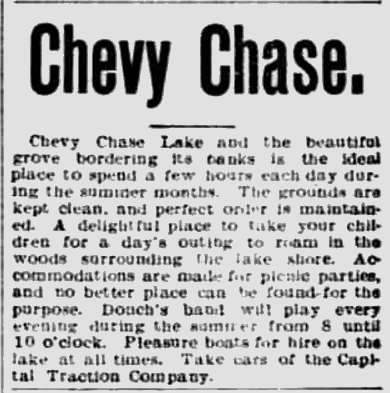Music for Listening and Dancing

Band Concerts were a popular form of entertainment in the 1890s, and a free concert in a park setting was a great attraction to those who lived in the Washington area, young and old alike. At Chevy Chase Lake, for just the price of a streetcar ride, residents of the city could enjoy a concert by one of the top orchestras of the day. In the beginning, the formal band concert was the prime musical feature at the Lake, but by the turn of the century, equal time was given to dance music, too. Perhaps it was the dance craze of the teens, but by World War I, music for the dance pavilions began to take precedence.
Professor Donch’s Band Plays at Chevy Chase Lake, 1896 to 1900
Many orchestras of the late nineteenth century were organized by teachers, often professors such as Henry Donch. Professor Donch taught a number of different instruments at Georgetown University: string instruments, including the violin, guitar, and banjo, as well as reed and brass instruments like the flute, clarinet and cornet. In addition to his work as a music teacher, he was the leader of Donch’s Band for more than forty years. He was a former member of the Naval Academy Band as well as the Marine Band, and well-known to the local musicians he hired to play at Chevy Chase Lake and other local venues. One of the leading bands at the time, it’s no coincidence that the managers of Chevy Chase Lake selected Professor Donch’s band to provide concerts each evening.
It was the custom to advertise band concerts simply by using the name of the leader, and Donch’s name is prominent in advertisements for Chevy Chase Lake in the late 1890s. In 1896, for example, a July 2nd advertisement for Chevy Chase Lake published in The Washington Post simply states under the “Chevy Chase Lake” headline:
“With music by Donch, from 2 to 6 and from 8 to 10 p.m. He is going to render a specially fine selection on that day, too. It won’t cost you a cent to hear it.”
The following year, on July 3rd, an advertisement for the Lake headlines one of the fantastic “Hydrocycles” as the key feature for the July 4th celebrations. But within the same ad, we see the familiar line: “Donch’s Band and dancing every evening on the pavilion.”
Henry Donch’s musical programs probably included light classical compositions and marches as well as the popular dance music of the day. Donch himself was a composer, and among his pieces were marches by the name of “Inspiration” and “Yacht Club March.” Everyday but Sunday, the first half of the band concert was for listening only – perhaps with Donch’s own compositions, along with other favorites. The second half of the concert was dance music, and dancers would crowd the open air pavilion. A June 17, 1899 article in The Washington Post describes the music for a typical Sunday:
“The Sunday evening programme will consist of sacred concerts by Prof. Donch’s band, with solos in moving boats on the lake.”
Such a concert would be an experience in terms of both sound and sight, especially with the soloists playing from boats on the lake. But on other nights, as detailed in a brief article on June 20th, just three days later, we learn that “Prof. Donch’s band grows in popularity as the season advances and each evening the big pavilion with its smooth floor is brought into requisition for those who enjoy dancing.” Thus, with the exception of Sundays, dancing in the pavilion always followed the formal band concert.
The Waltz and the Two-Step
The waltz and the two-step were the preferred dances of Prof. Donch’s time. On July 29, 1900, a brief Washington Post article about Chevy Chase Lake refers to Donch’s popularity with the “younger set”:
“…Dancing in the big pavilion continues to be as popular as ever with the ‘younger set.’ Prof. Donch’s Band plays all the popular waltzes and two-steps, and from early in the evening until ‘Home, Sweet Home’ is rendered, the floor space is always well filled.”
Prof. Donch’s Band was replaced by a division of the U.S. Marine Band the following year, in 1901. We do not know what determined this change, but the military band dominated the musical program at the Lake for the next fourteen years.
On the next page, learn more about the U.S. Marine Band performances at Chevy Chase Lake.


